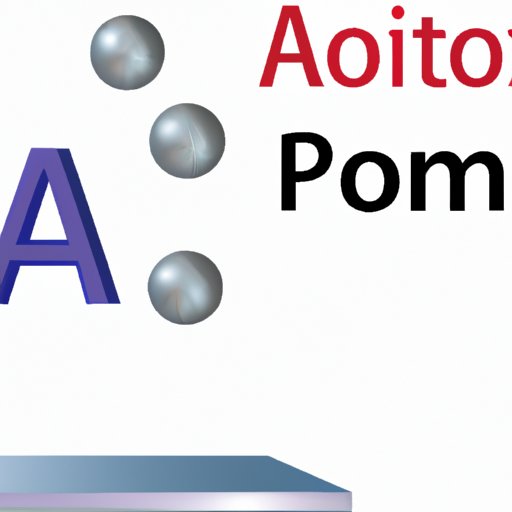Introduction
Protons are one of the three main particles that make up an atom. They are positively charged particles that have a mass of 1.6726 x 10-27 kg. Protons are found in the nucleus of an atom, which is located in the center. The number of protons in an atom determines what element it is.
Aluminum is an element with a wide range of uses. It is used in many everyday objects, from soda cans to airplanes. But how many protons does aluminum contain? In this article, we will explore the answer to this question.
Exploring the Number of Protons in Aluminum
In order to understand how many protons are in aluminum, we must first examine the chemistry and atomic structure of the element. This will help us to better understand the number of protons in aluminum.
Chemistry of Aluminum: How Many Protons Does It Contain?
Aluminum is a chemical element with an atomic number of 13. This means that it has 13 protons in its nucleus. It also has 13 electrons that orbit around the nucleus. Aluminum is a metal and is the third most abundant element on Earth, after oxygen and silicon.
Atomic Structure of Aluminum and Its Proton Count
Aluminum’s atomic structure consists of a nucleus surrounded by an electron cloud. The nucleus contains two types of particles: protons and neutrons. The number of protons in aluminum is equal to its atomic number, which is 13. This means that aluminum has 13 protons in its nucleus.
The number of neutrons in aluminum can vary. Most naturally occurring aluminum atoms have 14 neutrons, which gives them an atomic weight of 27. However, some atoms may have fewer or more neutrons, resulting in different atomic weights.
All About the Atomic Composition of Aluminum: How Many Protons?
Now that we know the basic chemistry and atomic structure of aluminum, let’s take a closer look at its atomic composition. This will help us to determine just how many protons are in aluminum.
Unveiling the Secrets of Aluminum’s Proton Count
Aluminum’s atomic structure consists of a nucleus made up of protons and neutrons. The number of protons in aluminum is equal to its atomic number, which is 13. This means that aluminum has 13 protons in its nucleus. The number of neutrons in aluminum can vary, but most naturally occurring atoms have 14 neutrons.
Examining the Number of Protons in Aluminum
By examining the atomic structure and composition of aluminum, we can conclude that aluminum has 13 protons in its nucleus. This is due to the fact that its atomic number is equal to the number of protons in its nucleus. The number of neutrons in aluminum can vary, but most naturally occurring atoms have 14 neutrons.
Conclusion
We have explored the number of protons in aluminum and found that it has 13 protons in its nucleus. This is due to the fact that its atomic number is equal to the number of protons in its nucleus. We have also examined the atomic structure and composition of aluminum, which helped us to determine the number of protons in aluminum.
The number of protons in aluminum is important to understand, as it helps us to identify the element and understand its properties. Knowing the number of protons in aluminum can also help us to understand other elements, as the number of protons in an element is directly related to its atomic number.
Summary of Findings
In summary, aluminum has 13 protons in its nucleus. This is due to the fact that its atomic number is equal to the number of protons in its nucleus. We have also examined the atomic structure and composition of aluminum, which helped us to determine the number of protons in aluminum.

Implications of the Proton Count in Aluminum
The number of protons in aluminum is important to understand, as it helps us to identify the element and understand its properties. Knowing the number of protons in aluminum can also help us to understand other elements, as the number of protons in an element is directly related to its atomic number.

